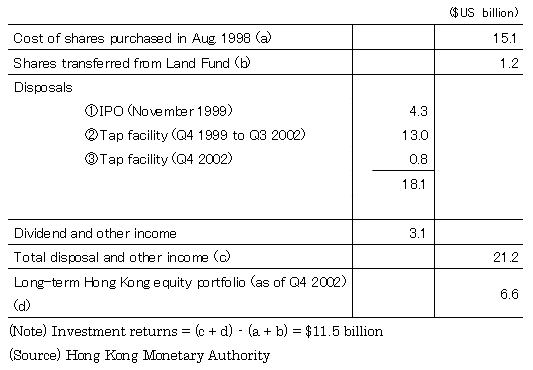On Sept. 18, the Bank of Japan announced that it would purchase banks' shareholdings, a move widely viewed as a taboo for a central bank. It is believed that such an action is unprecedented, but in fact, a similar measure was adopted in Hong Kong, and this experience is sure to be a good reference for Japan.
In recent years, it has become widely recognized in Japan that disposing the banks' non-performing loans is a precondition for any economic recovery. Amid such a situation, it is feared that the recent decline in stock prices will have an adverse effect on the capital bases and earnings of banks, which hold large amounts of stocks. This, in turn, would delay bad loan disposal and destabilize the entire financial system. The step taken by the BOJ is an attempt to reduce the amount of shares held by banks so as to lessen the adverse impact of stock price fluctuation risks on their balance sheets, so as to provide indirect assistance to their efforts to get rid of bad loans. The plan calls for the purchase of some ¥2 trillion worth of stocks, which is the equivalent of roughly 0.8 percent of the market capitalization of the Tokyo Stock Exchange.
In August 1998, when many Asian countries were plagued by a financial crisis, monetary authorities in Hong Kong purchased a large amount of stocks as part of their efforts to stabilize the financial system, including exchange rates. The authorities, determined to confront speculators, used foreign exchange reserves to buy some 15.1 billion U.S. dollars' worth (some ¥2.2trillion when calculated at exchange rates at the time) of shares in an attempt to shore up stock prices. Although this is about the same amount as that which the BOJ has decided to use, it had a much greater impact on the market because it was equivalent to 5 percent of the market capitalization of the Stock Exchange of Hong Kong.
Stock purchasing by a central bank is only an emergency measure. The BOJ's possession of a huge amount of stock makes the central bank itself vulnerable to stock price fluctuations and could also distort the formation of stock prices and in its turn adversely influence corporate governance. Therefore, the shares that are purchased must, at some point, be sold off. In fact, according to the announced plan, in principle the BOJ will hold the shares for at least five years and sell them within 15 years' time whenever market conditions allow.
In an effort to keep market confusion at a minimum and ensure an orderly sell-off of the shares it purchased, the Hong Kong government (monetary authorities) set up TraHK (Tracker Fund of Hong Kong), which is linked with the benchmark Hang Seng Index and comprised of the shares it bought. (note 1) In November 1999, as the first step in its share disposal program, TraHK was launched with an initial public offering of 4.3 billion U.S. dollars. This IPO was the largest ever in the Asian region outside Japan. Since then, the shares have been sold off in stages, and by October 2002, 21.2 billion U.S. dollars' worth of shares have been returned to the market. At this point, the disposal of the shares is practically complete, as monetary authorities say they plan to continue holding the remaining 6.6 billion U.S. dollars' worth of shares still in the portfolio as a long-term investment. The rise in stock prices during the time the authorities held the shares has helped result in 11.5 billion U.S. dollars' worth of profit in dividend income and capital gains.
Initially, the intervention of monetary authorities in the stock market was not welcomed with open arms, as it was seen as a measure that deviated sharply from Hong Kong's traditional "hands-off" economic policy, and it was ridiculed by local media as signifying the "death of Hong Kong." However, the subsiding of the currency crisis and the rise in stock prices have helped overturn that assessment, and now the measure is seen as being a success. How the BOJ policy is judged will, in the end, hinge not just on whether it contributes to financial system stability but also whether there is a rise in the price of the stock it purchases.
Table 1: Hong Kong equity portfolio of the exchange fund



